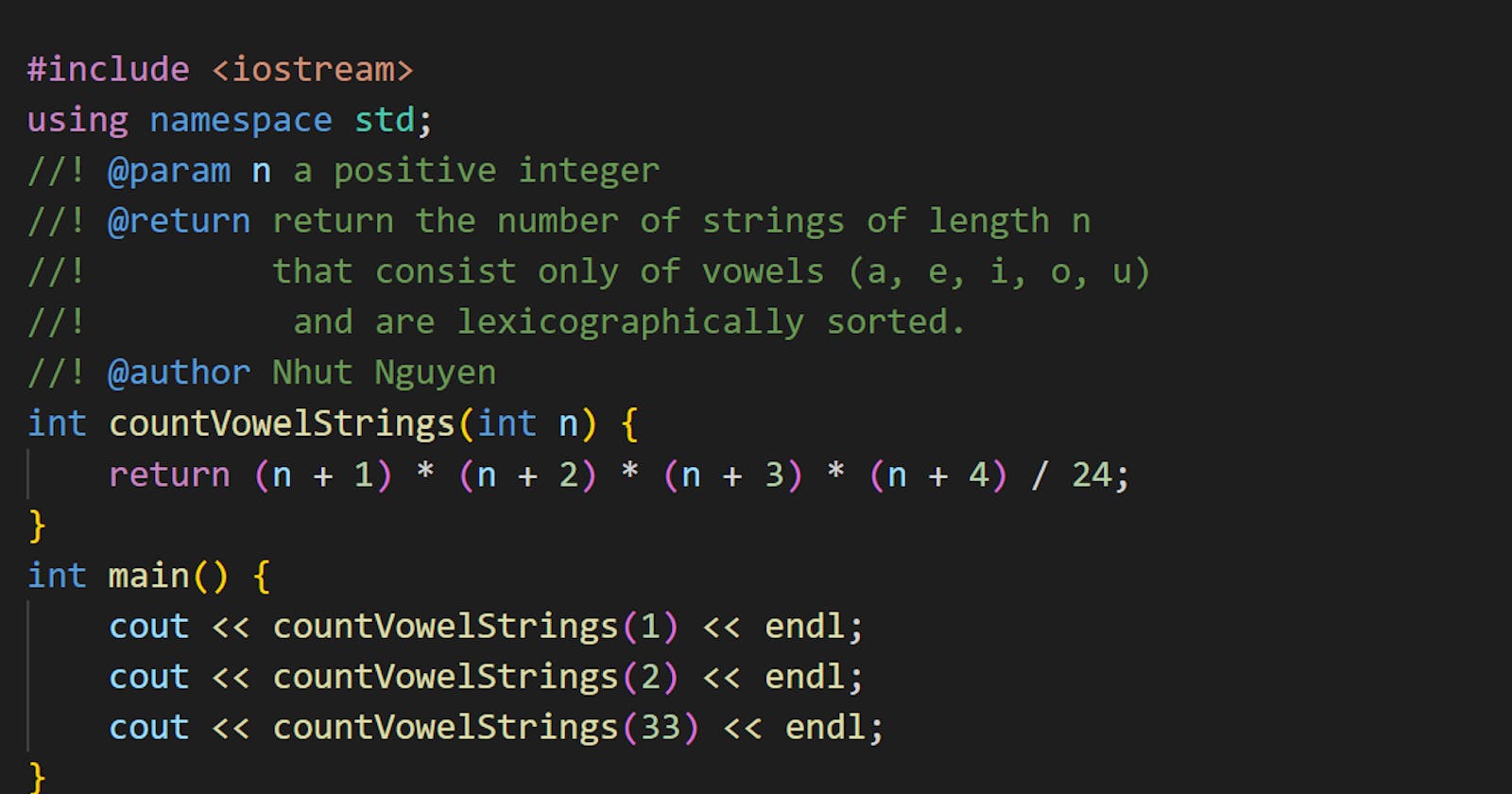How to solve Leetcode 1641. Count Sorted Vowel Strings
The math behind the problem
Problem statement
Given an integer n, return the number of strings of length n that consist only of vowels (a, e, i, o, u) and are lexicographically sorted.
A string s is lexicographically sorted if for all valid i, s[i] is the same as or comes before s[i+1] in the alphabet.
Example 1
Input: n = 1
Output: 5
Explanation: The 5 sorted strings that consist of vowels only are ["a","e","i","o","u"].
Example 2
Input: n = 2
Output: 15
Explanation: The 15 sorted strings that consist of vowels only are
["aa","ae","ai","ao","au","ee","ei","eo","eu","ii","io","iu","oo","ou","uu"].
Note that "ea" is not a valid string since 'e' comes after 'a' in the alphabet.
Example 3
Input: n = 33
Output: 66045
Constraints
1 <= n <= 50.
Solution 1: Finding the pattern
Let us find the relationship of the strings between the vowels.
Example 3
For n = 3:
There is (always) only one string starting from
u, which isuuu.There are 3 strings starting from
o:ooo,oouandouu.There are 6 strings starting from
i:iii,iio,iiu,ioo,iou,iuu.There are 10 strings starting from
e:eee,eei,eeo,eeu,eii,eio,eiu,eoo,eou,euu.There are 15 strings starting from
a:aaa,aae,aai,aao,aau,aee,aei,aeo,aeu,aii,aio,aiu,aoo,aou,auu.In total: there are 35 strings that satisfy the problem.
Findings
In Example 3, if you ignore the leading vowel of those strings, then the shorted strings of the line above all appear in the ones of the line below and the remaining strings of the line below come from n = 2.
More precisely:
All the shorted strings
oo,ouanduustarting fromoappear on the ones starting fromi. The remainingii,io,iustarting fromicome from the strings of lengthn = 2(see Example 2).Similarly, all shorted strings
ii,io,iu,oo,ou,uustarting fromiappear on the ones starting frome. The remainingee,ei,eo,eucome fromn = 2.And so on.
That leads to the following recursive relationship.
Let S(x, n) be the number of strings of length n starting from a vowel x. Then
S('o', n) = S('o', n - 1) + S('u', n)for alln > 1.S('i', n) = S('i', n - 1) + S('o', n)for alln > 1.S('e', n) = S('e', n - 1) + S('i', n)for alln > 1.S('a', n) = S('a', n - 1) + S('e', n)for alln > 1.S(x, 1) = 1for all vowelsx.S('u', n) = 1for alln >= 1.
For this problem, you want to compute
S(n) = S('a', n) + S('e', n) + S('i', n) + S('o', n) + S('u', n).
Code
#include <iostream>
using namespace std;
int countVowelStrings(int n) {
int a, e, i, o, u;
a = e = i = o = u = 1;
while (n > 1) {
o += u;
i += o;
e += i;
a += e;
n--;
}
return a + e + i + o + u;
}
int main() {
cout << countVowelStrings(1) << endl;
cout << countVowelStrings(2) << endl;
cout << countVowelStrings(33) << endl;
}
Output:
5
15
66045
Complexity
Runtime:
O(n).Extra space:
O(1).
Solution 2: The math behind the problem
The strings of length n you want to count are formed by a number of 'a', then some number of 'e', then some number of 'i', then some number of 'o' and finally some number of 'u'.
So it looks like this
s = "aa..aee..eii..ioo..ouu..u".
And you want to count how many possibilities of such strings of length n.
One way to count it is using combinatorics in mathematics.
If you separate the groups of vowels by '|' like this
s = "aa..a|ee..e|ii..i|oo..o|uu..u",
the problem becomes counting how many ways of putting those 4 separators '|' to form a string of length n + 4.
In combinatorics, the solution is (n + 4 choose 4), where (n choose k) is the binomial coefficient:

The final number of strings is

Code
#include <iostream>
using namespace std;
int countVowelStrings(int n) {
return (n + 1) * (n + 2) * (n + 3) * (n + 4) / 24;
}
int main() {
cout << countVowelStrings(1) << endl;
cout << countVowelStrings(2) << endl;
cout << countVowelStrings(33) << endl;
}
Output:
5
15
66045
Complexity
Runtime:
O(1).Extra space:
O(1).

